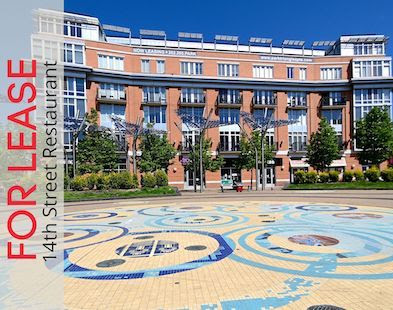 In a spirited zoning board hearing last night, the Friedman Capital Advisors and Beztak Companies' - developers for the Adams Morgan church hotel - presented a strong case in support of the project, while critics found themselves on the ropes - at one point, with deliberations becoming so heated that a screaming woman in the audience had to be escorted out by security.
In a spirited zoning board hearing last night, the Friedman Capital Advisors and Beztak Companies' - developers for the Adams Morgan church hotel - presented a strong case in support of the project, while critics found themselves on the ropes - at one point, with deliberations becoming so heated that a screaming woman in the audience had to be escorted out by security.It was a striking contrast with last week's hearing, in which developers were roundly and repeatedly rebuked by the board for a late and insufficient submission.
 This hearing kicked off with Councilman Jim Graham reading a statement in support of the project. Treated with worshipful deference by the board, Graham said the hotel was "overwhelmingly supported and endorsed by residents. I live about two blocks away from the location myself." He also defended the controversial $46 million tax abatement given to the developers, stating "this project will create jobs, and they can't build this project without the abatement." (Can't or won't, though let's give the honorable councilman the benefit of the doubt here.)
This hearing kicked off with Councilman Jim Graham reading a statement in support of the project. Treated with worshipful deference by the board, Graham said the hotel was "overwhelmingly supported and endorsed by residents. I live about two blocks away from the location myself." He also defended the controversial $46 million tax abatement given to the developers, stating "this project will create jobs, and they can't build this project without the abatement." (Can't or won't, though let's give the honorable councilman the benefit of the doubt here.) Graham also presented the hotel project as something of a last chance for the historic 100 year old First Church of Christ, Scientist facade, as the owners have vowed to sell it to other developers if the hotel project falls through, and "if that happens, the church will be lost. Which no one wants." Graham went on to acknowledge that there were still people who had legitimate objections to the project, but that it should move forward.
Graham also presented the hotel project as something of a last chance for the historic 100 year old First Church of Christ, Scientist facade, as the owners have vowed to sell it to other developers if the hotel project falls through, and "if that happens, the church will be lost. Which no one wants." Graham went on to acknowledge that there were still people who had legitimate objections to the project, but that it should move forward.Board member Peter May, the lone skeptic, asked Graham to elaborate on these legitimate objections. Showing why he's survived in politics all these years Graham adlibbed a meandering non-response that included the phrase, "projects like this deal with challenges all over the city. All over the world!"
Vice Chairman Marcie Cohen shared neighborhood concerns about traffic, saying she walks her dog on Champlain all the time, and "always notices lots of traffic, and parking on both sides." (Anyone who frequents the Adams Morgan area has surely noticed the same.)
But a traffic consultant swore that after reviewing the traffic impact analysis, the hotel would not create more traffic. Cohen, clearly skeptical, asked, "So even though it'll be heavily traveled and there'll be increased movement with taxis, et cetera, there's no significant impact?"
"No," said the consultant, "No significant impact." There followed a long silence in which everyone debated internally whether to trust the science. There followed a long presentation by the developers, which contained a few interesting tidbits.
- Chopping off the top floor increased per-room costs to $530,000, from $486,000; $500,000 per room is the industry threshold for profitability in a project like this, so the loss of that extra height could be a significant blow.
- The building will seek LEED Silver certification, at least.
- Assuming the zoning board gives approval, developers are looking at a hearing with the HPRB around Thanksgiving.
- Under questioning about a vague section of the plans, it emerged that the toilet exhaust fans blow out into the courtyard. "This seems to be problematic," said one board member.
 And then there were the fireworks. After it emerged that a man who claimed to represent a group of Champlain Street residents under the name "Champlain Street Neighbors," only represented one actual Champlain Street resident, and seemed to have padded his resident list with inaccurate and/or questionable names, the board went on the offensive. Chairman Hood noted it was a "federal offense to falsify a federal form," and moved to revoke the organization's party status. Under questioning, the man's case seemed to fall apart, and his sub-Jim-Graham-level adlibbing skills ("How many people on this list live on Champlain Street?" "Yes.") only further annoyed the board. Hood accused him of submitting "misleading documents" and was "very taken back" and intended to "talk to legal counsel." When a woman in the audience loudly protested this, Hood had her removed from the hearing, and called for a recess.
And then there were the fireworks. After it emerged that a man who claimed to represent a group of Champlain Street residents under the name "Champlain Street Neighbors," only represented one actual Champlain Street resident, and seemed to have padded his resident list with inaccurate and/or questionable names, the board went on the offensive. Chairman Hood noted it was a "federal offense to falsify a federal form," and moved to revoke the organization's party status. Under questioning, the man's case seemed to fall apart, and his sub-Jim-Graham-level adlibbing skills ("How many people on this list live on Champlain Street?" "Yes.") only further annoyed the board. Hood accused him of submitting "misleading documents" and was "very taken back" and intended to "talk to legal counsel." When a woman in the audience loudly protested this, Hood had her removed from the hearing, and called for a recess.The recess seemed to calm everyone's nerves, though it was getting late and Hood moved to end the hearing. The next meeting was set for October 10, and judging by the tone of this latest hearing, the hotel project is well on its way.






2 comments:
I appreciate DCmud's detailed reporting on this and other stories, but it's a bit annoying that you all repeatedly get an important detail wrong -- the name of the body in DC that hears Planned Unit Development cases is the Zoning Commission (not "board"). There is another body that hears some zoning cases called the Board of Zoning Adjustment (or BZA). The BZA hears variance and special exception cases. Your continued use of the term "board" to refer to the Zoning Commission risks unnecessary confusion.
This building was a part of my life from 1952 through 1973. I knew it when leading members of the Washington community filled its vast auditorium. Marjorie Merriweather Post; Perle Mesta; a Rockefeller or two; senators a many; senior State Dept and foreign-service officials; Hollywood luminaries, e.g., Doris Day, Mary Martin, Robert Duvall, Debbie Reynolds, Milton Berle, and others (when visiting); and prominent writers, journalists, and observers of the Washington scene were seen on these steps. The auditorium with mahoghany pews had a fine acoustic, magnificent organ, and massive Tiffany chandeliers.
I recall also when leaders of this church fought hard to preserve rental flats in adjacent buildings, several which the church owned, during the painful destabilisation in Washington that followed the 1962 local housing desegregation act. The church then resisted development pressure to agree to demolish housing in order to prevent unwanted demographic change in the neighbourhood. As teh neighbourhood declined from 1967 through the 1970s, the church became little more than a forgotten, fenced-off shadow over Columbia Road. Few and fewer who passed understood its relevance as a church founded by a woman, designed to reinforce confidence amongst emerging urban classes of "young professionals", and offer anj intellectualised 19th-20th-century alternative to the over-argued "Trinitarian Aritmentic" that George bernard Shaw complained of.
While deeply flawed in intellectual logic, as I would argue most "faiths" are, Christian Science was not the Scientology of its time. Theologically, it was overinvested in "Perfection" and it has failed as our cultures have come to celebrate, thankfully, imperfection. Tolstoy could've told you more, as could Albert Einstein, who attended Christian Science services in Berne and Princeton throughout much of his life.
I am quite distant today, and was never a member of Christian Scientist. The virtual demise of the organisation is "one of those things", but the loss of this grand edifice to fantasist architects hired to build a Marriott Hotel seems an exceptionally cruel fate. I came upon this developmentduring a recent trip to Washington and it has profoundly saddened me.
Why not have converted the building into a concert venue? Could the government not find means to subsidise transformations suited to cultural or educational use?
None in the Council meeting reported above recall when the pre-"Adams Morgan" neighbourhood was as close as one could get to Paris on that side of the Big Pond.
No European city would have allowed for such a pathetica "democratic" process to destroy such architectural patrimony.
Post a Comment
Commercial ads will be deleted, so don't even think about it.